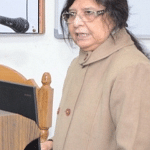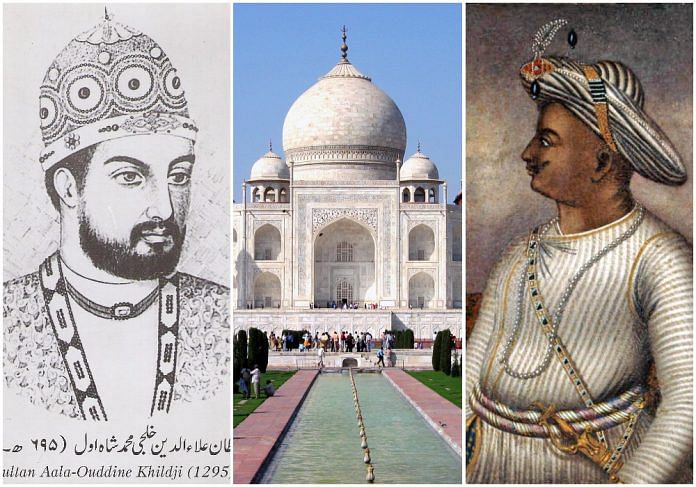The trailer of the period film Padmavati, calling the Taj Mahal a Mughal “blot”, and crying foul at the annual Tipu Sultan celebrations — have all fueled a heated public debate about how Indians want to understand centuries of Muslim invasion and rule. Is this debate about history or about how Indians want to assert their national identity today?
Taj Mahal, Khilji, Tipu: Is political polarisation leading to demonising India’s Muslim rulers as alien? We bring sharp perspectives.
Tipu was the only independent ruler in India in the 18th century who was a moderniser
 S. Irfan Habib
S. Irfan Habib
Historian
You can rewrite history but you can’t change it, what has happened, has happened. It says something ominous about our own culture that we are not able to appreciate the Taj Mahal or other monuments. Those who call themselves patriots are actually discrediting the country in the world.
There are two schools of thought on Tipu Sultan in British history. One of them denounces him and the others consider him to be a formidable opponent. The Hindutva advocates rely on the former.
Tipu Sultan did commit some atrocities, when suppressing rebellion in Coorg in Malabar, but he was not the only one who committed so many atrocities when rebellion took place. But what set Tipu Sultan apart was his very spirited resistance to Britain, and that he was the only independent ruler in India in the 18th century who was a moderniser and introduced modern manufacturing.
He also established sericulture, the silk industry in Karnataka. What Tipu did should be a matter of pride for India.
It is important to answer them point by point on the Taj Mahal and so on. But essentially, we should promote a secular and rational outlook. By making concessions to what is often called soft Hindutva or soft Islam, you clearly cannot win the battle of minds.
This kind of rhetoric by members of the BJP has brought disrespect to India. People abroad see Indians disrespecting historical monuments and figures.
The Taj Mahal and Tipu Sultan are not the real issues. The issues of employment, poverty and particularly the growth of the economy, demonetisation and GST are more important.
The Indian people should take lessons from Pakistan. Religious chauvinism will only destroy the country.
Today’s Muslim leadership need not and should not take Khilji as a part of their heritage
 Vijay Chauthaiwale
Vijay Chauthaiwale
BJP leader
I would like to differentiate between the debate on the Taj Mahal and Muslim rulers like Khilji and Tipu. The Taj is a world-class monument, I myself have visited it several times and appreciated it’s beauty. But the same does not hold true for Khilji and Tipu.
The likes of Khilji have destroyed hundreds, if not thousands of monuments, sculptures, temples all across India, not once or twice but several times. How Afzal Khan had destroyed the most revered Bhavani temple in Tuljapur, Maharashtra is well documented, so is the destruction of Somnath by Khilji.
There is no artificial need to demonise them, their atrocities speak for themselves. Is there a single example of a Hindu king doing the same?
This issue should therefore be seen in a larger context. Today’s Muslim leadership need not and should not take Khilji as a part of their heritage and accept it as a tragic and deplorable part of Indian history.
As an analogy of different sort, Hindus too had several deplorable kinds of traditions like Sati, caste discrimination, untouchability, etc. But it was Hindu leadership like Raja Rammohan Roy, Phule, Ambedkar, Karve, Savarkar, and Deoras who not only condemned these customs in the strongest possible terms, but also strived to eliminate them.
On the same lines, today’s Muslim leadership need not and should not take Khilji as a part of their heritage. On the contrary, accept it as a tragic and deplorable chapter of history and move on. A few chapters of history are indefensible, and no one, Hindu or Muslim, should be shy of accepting the same.
(Opinion is strictly personal)
The entire debate on the Taj Mahal or Tipu is a political argument, not a historical one
 Hilal Ahmed
Hilal Ahmed
Associate Professor, CSDS, author of ‘Muslim Political Discourse in Postcolonial India: Monuments, Memory, Contestation’
The technique by which the Muslim past or the contribution of Muslim rulers is being relegated to the margin by Hindutva forces in recent years is inextricably linked to the Hindutva version of Indian history.
Hindutva inherits the colonial imagination of India’s past — Ancient India, considered to be Hindu India (though Aryan invasion theory somehow disturbed the flow of that argument); medieval India as Muslim India in which outsiders attacked India and demolished Hindu religious places of worship and forced conversion; and the modern India, which begins with the rise of Indian Renaissance (read Hindu awakening)!
In this framework, the Muslim invasion is marked as a rupture that seems to disturb the natural flow of the past. To correct the past, it is argued, there is a need to remove the symbols of humiliation and make the Hindu identity more natural and assertive.
But it is a weak argument, historically. This is a reason why Hindutva forces sidestep the realm of history to problematise popular symbols as markers of humiliation.
Because our modern imagination of India’s past and the classification into three broad phases is problematic, we usually think that this entire project of Hindutva is historical. This is absolutely wrong.
The distinction between a political argument and a historical argument is very important here. The claims of Hindutva organisations are political, not historical.
This entire debate on the Taj Mahal or Tipu is a political argument. Who built what and when is unimportant because heritage is always interpreted in number of different ways.
Gandhi seems to give a very powerful argument to the claims of Hindutva organisations. In ‘Hind Swaraj’, he wrote that our modern history does not have the capacity to record the soul-force, the force that binds us together as a nation. Therefore, we have to assert that soul force which is there in the past.
No contemporary or past work in history says Khilji’s a debauch — except in Padmavati, which of course is not a book of history
 Shireen Moosvi
Shireen Moosvi
Professor of History, Aligarh Muslim University
There is a sinister plan to demonise Indian Muslim rulers to achieve polarization. Society was not polarized in this fashion ever before as is being been done today, especially by the RSS. Since they are now in power they have better means to polarise.
Had the RSS been treated with the contempt it deserves in media, perhaps they would not have been as successful.
Someone as ignorant as Sangeet Som is saying that the Mughal ruler Shah Jahan imprisoned his father. Everybody knows that it was he who was put under surveillance in Red Fort by Aurangzeb.
Take Alauddin Khilji. In history he is known as being the only other person who established the first all-India state after the Mauryas. He is known for bringing about a system of revenue realisation, where he said all stratas would pay the same revenue, and prices will be lowered in the market through controls.
No contemporary or past work in history says Khilji’s a debauch — except in Padmavati, which of course is not a book of history.
About Tipu Sultan, while most Indian rulers had succumbed to pressure, he considered martyrdom as an option. The only defeat that the English received was at the hands of Tipu in the third Anglo-Mysore war. He tried to have an alliance with the Ottoman and the French to throw the British out of India.
Traitor means a person who is disloyal to their own country. How can those who have never participated in India’s freedom struggle, who always remained loyal to the British, who on the bidding of British came out of with the slogan of “Hindi Hindu Hindustan”– the Hindu Mahasabha – how can they admire and respect those who fought for the country?
It is the policy of the RSS now to let people fight amongst themselves so they can rule.
Khilji, Shah Jahan or Tipu Sultan, they are as much part of India’s history as Rana Pratap and Shivaji
 Shikha Jain
Shikha Jain
Director, Development and Research Organisation for Nature, Arts and Heritage
India’s diverse, multi-ethnic and inclusive cultural identity asserts itself in iconic architectural masterpieces built through centuries of its glorious past. The Taj is symbolic of India’s cultural image and limiting it to being a creation of an Islamic ruler is sheer lack of understanding of our civilisational existence.
India is often called the melting pot of several ideas and beliefs which allows India to remain secular and be the bedrock of cultural diversity while sharing connections with different regions such as Africa, Arab and Asia. India should actually build on this strength to revive and nurture cultural exchanges with other nations rather than focus on petty issues of removing certain names from Indian history based on political bias.
There is no doubt that current historical texts used in Indian schools and colleges are flawed and require serious revisions. Being largely written in the colonial and post-colonial scenario, most of them lack a comprehensive regional context. Regional rulers like the Marathas, Sikhs, Rajputs, and others are marginalised compared to the focus and dominance given to the Mughal and British Imperial rulers.
An analysis of World Heritage Sites in India shows a clear dominance of Mughal period, which is disappointing considering India’s rich and diverse heritage sites since Harrapan times. This gap, however needs to be supplemented with a research-based scientific approach to include the missing pieces in Indian history for a more balanced and realistic historical narrative of the nation and each of its region – not a blind removal of existing historical figures based purely on political motivation.
Khilji, Shah Jahan or Tipu Sultan, they are as much part of India’s history as Rana Pratap and Chatrapati Shivaji. History is about kingdoms, rulers, regimes, people, cities, and settlements; creation as well as destruction. And our future generations have the right to know it all.
Any monument that these Muslim rulers left behind is marked for derision, like the Taj Mahal
 Srijan Sandip Mandal
Srijan Sandip Mandal
Faculty, Center for Public History, Srishti Institute of Art, Design and Technology, Bengaluru
The demonisation of India’s erstwhile Muslim rulers as alien is one of the tools used for manufacturing political polarisation along communal lines. Communal polarisation, as the Ram Janmabhoomi movement demonstrated, tends to yield rich electoral dividends since it can reduce citizens to their religious identities, thereby creating potential vote banks around religion in a country where 80 per cent of the population is enumerated as Hindu.
However, sustaining such a vote bank, given the fissures within the Hindu fold, requires almost constant “othering” along religious lines. The foreign origins of their faiths makes Muslims and Christians ideal candidates for othering, especially Muslims given the duration of the so-called Muslim rule in India.
The principal tropes of othering are to portray these Muslim rulers, such as Tipu Sultan and Alauddin Khilji, either as fanatical bigots, whose twin goals were oppressing Hindus and forcibly converting them to Islam, or as lecherous invaders who not only conquered Hindu lands, but also coveted Hindu women.
In keeping with these tropes, then, any monument that these Muslim rulers left behind is marked for derision like the Taj Mahal, if not demolition like the Babri Masjid. In such a worldview, the idea of celebrating such structures as Indian heritage would be as foreign as the so-called foreigners who had them built. Ironically, though, that has never stopped those who share this worldview from appropriating tropes about Muslims of British provenance such as the “fanatical bigot” or “lecherous invader”.
Political controversies around kings and historical monuments are tragic reminders of Germany’s ban on so-called ‘degenerate art’ for their un-German, and Jewish moorings
 Ashwani Kumar
Ashwani Kumar
Poet, author and Professor at Tata Institute of Social Sciences (Mumbai).
Rooted in the Islamophobia and competitive electoral insecurities, controversies around the Taj, and warrior king Tipu Sultan are part of a perverse, puritanical political fantasy of ‘Make-in -India’. There is a gut-wrenching political message here. Bleeding by the political failures of demonetisation and GST, these controversies signal the most audacious and ambitious Plan-B of the ruling party to win 2019 parliamentary elections.
It is a dangerous and absurd political imagining. Unsurprisingly, the more swacch (clean) India becomes, the more unclean it becomes in its pursuit of a totalitarian politics of hate and prejudice.
These controversies and claims are not new. Hindu right-wingers have often fabricated the past and invented a spuriously militant identity of Hindu superiority to create a hegemonic master Hindu race. And this emergent politics of pure and divine master race is being calibrated to organise eliminationist genocide of so-called anti-nationals and traitors.
Political controversies around great kings and historical monuments are tragic reminders of Germany’s ban on so-called ‘degenerate art’ on the grounds of their un-German, and Jewish moorings. Given the syncretic religious and cultural traditions of India since time immemorial, this is bizarre and frightening. I don’t know whether to weep or marvel at our increasing innocence about the monster of religious barbarism in India.




@Hilal Ahmed, i endorse your views, but hindutva forces, as i have understood it, is a pure political movement, which tries to enter our civic domain by using various symbols, by changing the image or to be more precise, photos of gods, by using bhajans and so on to construct a modern hindu identity and to make it more concrete, they play anti-muslim card, and to make their claim acceptable, they are bound to deconstruct the muslim rule in india, to use partition as tool, and many muslim rulers. What is missing in your argument is the complex nature of indian caste system, where religious identity many times is not important. The picture of south indian culture and politics is again a hindrance in their political ways. Their politics cannot sustain in long run, and that is why they talk more about corruption, jobs, economy etc. Their local leaders have taken the command to instigate such issues, and bjp face criticism. The contemporay bjp is occilating between politics of development and politics of identity. The sooner it realize the essence of our multicultural democracy, the problem of unemployment, price rise and so on, the better of it, but again impossible for bjp to take a stand by leaving its ideology and its legacy behind.
I think every sane Indian should try to vehemently counter the insanity that the present dispensation is trying to instill in the minds of the common man on the street. Every available communication portal should be availed of. The spread of hatred and disharmony should be stopped at all cost.